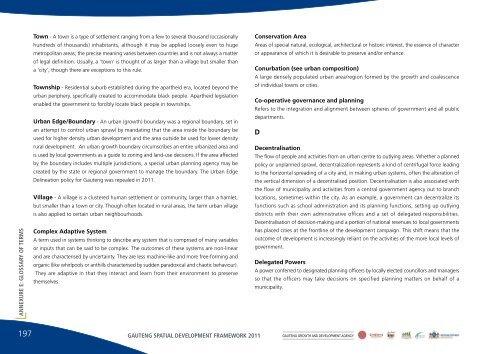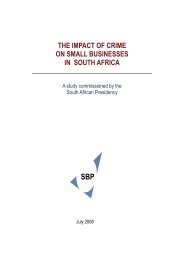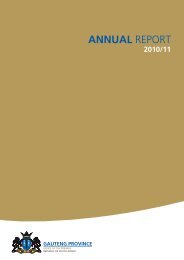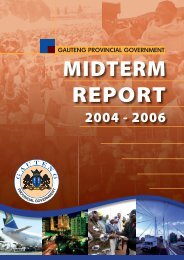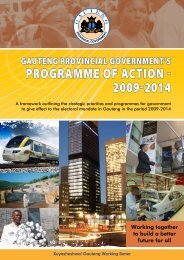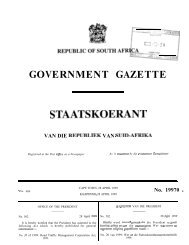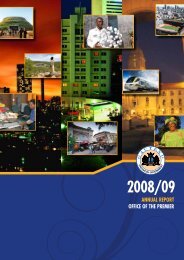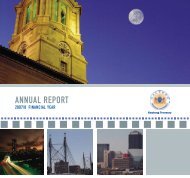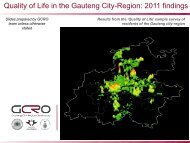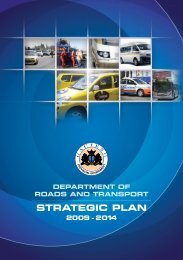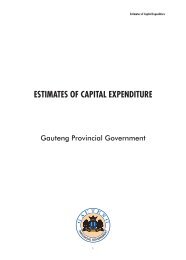the gauteng spatial development framework - Gauteng Online
the gauteng spatial development framework - Gauteng Online
the gauteng spatial development framework - Gauteng Online
Create successful ePaper yourself
Turn your PDF publications into a flip-book with our unique Google optimized e-Paper software.
ANNEXURE E: GLOSSARY OF TERMSTown - A town is a type of settlement ranging from a few to several thousand (occasionallyhundreds of thousands) inhabitants, although it may be applied loosely even to hugemetropolitan areas; <strong>the</strong> precise meaning varies between countries and is not always a matterof legal definition. Usually, a 'town' is thought of as larger than a village but smaller thana 'city', though <strong>the</strong>re are exceptions to this rule.Township - Residential suburb established during <strong>the</strong> apar<strong>the</strong>id era, located beyond <strong>the</strong>urban periphery, specifically created to accommodate black people. Apar<strong>the</strong>id legislationenabled <strong>the</strong> government to forcibly locate black people in townships.Urban Edge/Boundary - An urban (growth) boundary was a regional boundary, set inan attempt to control urban sprawl by mandating that <strong>the</strong> area inside <strong>the</strong> boundary beused for higher density urban <strong>development</strong> and <strong>the</strong> area outside be used for lower densityrural <strong>development</strong>. An urban growth boundary circumscribes an entire urbanized area andis used by local governments as a guide to zoning and land-use decisions. If <strong>the</strong> area affectedby <strong>the</strong> boundary includes multiple jurisdictions, a special urban planning agency may becreated by <strong>the</strong> state or regional government to manage <strong>the</strong> boundary. The Urban EdgeDelineation policy for <strong>Gauteng</strong> was repealed in 2011.Village - A village is a clustered human settlement or community, larger than a hamlet,but smaller than a town or city. Though often located in rural areas, <strong>the</strong> term urban villageis also applied to certain urban neighbourhoods.Complex Adaptive SystemA term used in systems thinking to describe any system that is comprised of many variablesor inputs that can be said to be complex. The outcomes of <strong>the</strong>se systems are non-linearand are characterised by uncertainty. They are less machine-like and more free-forming andorganic (like whirlpools or anthills characterised by sudden paradoxical and chaotic behaviour).They are adaptive in that <strong>the</strong>y interact and learn from <strong>the</strong>ir environment to preserve<strong>the</strong>mselves.Conservation AreaAreas of special natural, ecological, architectural or historic interest, <strong>the</strong> essence of characteror appearance of which it is desirable to preserve and/or enhance.Conurbation (see urban composition)A large densely populated urban area/region formed by <strong>the</strong> growth and coalescenceof individual towns or cities.Co-operative governance and planningRefers to <strong>the</strong> integration and alignment between spheres of government and all publicdepartments.DDecentralisationThe flow of people and activities from an urban centre to outlying areas. Whe<strong>the</strong>r a plannedpolicy or unplanned sprawl, decentralization represents a kind of centrifugal force leadingto <strong>the</strong> horizontal spreading of a city and, in making urban systems, often <strong>the</strong> alteration of<strong>the</strong> vertical dimension of a decentralised position. Decentralisation is also associated with<strong>the</strong> flow of municipality and activities from a central government agency out to branchlocations, sometimes within <strong>the</strong> city. As an example, a government can decentralize itsfunctions such as school administration and its planning functions, setting up outlyingdistricts with <strong>the</strong>ir own administrative offices and a set of delegated responsibilities.Decentralisation of decision-making and a portion of national revenues to local governmentshas placed cities at <strong>the</strong> frontline of <strong>the</strong> <strong>development</strong> campaign. This shift means that <strong>the</strong>outcome of <strong>development</strong> is increasingly reliant on <strong>the</strong> activities of <strong>the</strong> more local levels ofgovernment.Delegated PowersA power conferred to designated planning officers by locally elected councillors and managersso that <strong>the</strong> officers may take decisions on specified planning matters on behalf of amunicipality.197 GAUTENG SPATIAL DEVELOPMENT FRAMEWORK 2011 GAUTENG GROWTH AND DEVELOPMENT AGENCY


